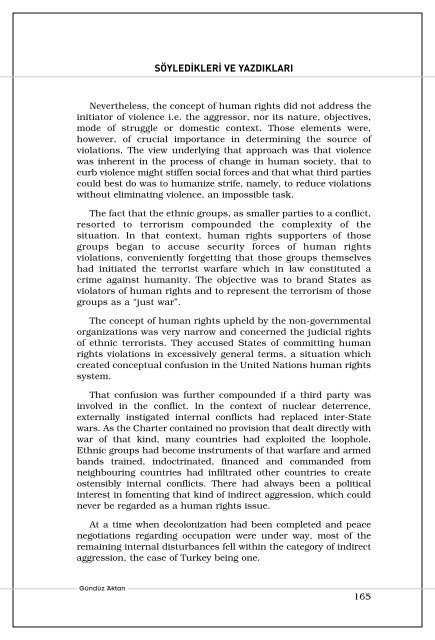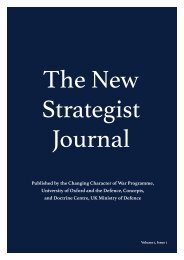gunduz-aktan-kitap-soyledikleri-ve-yazdiklari
gunduz-aktan-kitap-soyledikleri-ve-yazdiklari
gunduz-aktan-kitap-soyledikleri-ve-yazdiklari
Create successful ePaper yourself
Turn your PDF publications into a flip-book with our unique Google optimized e-Paper software.
SÖYLEDİKLERİ VE YAZDIKLARI<br />
Ne<strong>ve</strong>rtheless, the concept of human rights did not address the<br />
initiator of violence i.e. the aggressor, nor its nature, objecti<strong>ve</strong>s,<br />
mode of struggle or domestic context. Those elements were,<br />
howe<strong>ve</strong>r, of crucial importance in determining the source of<br />
violations. The view underlying that approach was that violence<br />
was inherent in the process of change in human society, that to<br />
curb violence might stiffen social forces and that what third parties<br />
could best do was to humanize strife, namely, to reduce violations<br />
without eliminating violence, an impossible task.<br />
The fact that the ethnic groups, as smaller parties to a conflict,<br />
resorted to terrorism compounded the complexity of the<br />
situation. In that context, human rights supporters of those<br />
groups began to accuse security forces of human rights<br />
violations, con<strong>ve</strong>niently forgetting that those groups themsel<strong>ve</strong>s<br />
had initiated the terrorist warfare which in law constituted a<br />
crime against humanity. The objecti<strong>ve</strong> was to brand States as<br />
violators of human rights and to represent the terrorism of those<br />
groups as a “just war”.<br />
The concept of human rights upheld by the non-go<strong>ve</strong>rnmental<br />
organizations was <strong>ve</strong>ry narrow and concerned the judicial rights<br />
of ethnic terrorists. They accused States of committing human<br />
rights violations in excessi<strong>ve</strong>ly general terms, a situation which<br />
created conceptual confusion in the United Nations human rights<br />
system.<br />
That confusion was further compounded if a third party was<br />
invol<strong>ve</strong>d in the conflict. In the context of nuclear deterrence,<br />
externally instigated internal conflicts had replaced inter-State<br />
wars. As the Charter contained no provision that dealt directly with<br />
war of that kind, many countries had exploited the loophole.<br />
Ethnic groups had become instruments of that warfare and armed<br />
bands trained, indoctrinated, financed and commanded from<br />
neighbouring countries had infiltrated other countries to create<br />
ostensibly internal conflicts. There had always been a political<br />
interest in fomenting that kind of indirect aggression, which could<br />
ne<strong>ve</strong>r be regarded as a human rights issue.<br />
At a time when decolonization had been completed and peace<br />
negotiations regarding occupation were under way, most of the<br />
remaining internal disturbances fell within the category of indirect<br />
aggression, the case of Turkey being one.<br />
Gündüz Aktan<br />
165



